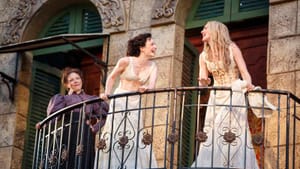Stay in the Loop
BSR publishes on a weekly schedule, with an email newsletter every Wednesday and Thursday morning. There’s no paywall, and subscribing is always free.
Merry sparring under starry skies
'Much Ado About Nothing' at Shakespeare in the Park

“You say ‘potato,’ I say ‘po-tah-to’; you say ‘tomato,’ I say ‘to-mah-to’ . . . let’s call the whole thing off.” So go the Gershwin lyrics about the ongoing war between men and women. Sparring couples are the stuff that romantic comedies are made of, as film buffs will attest. Watching these dueling duets (Meg Ryan vs. Billy Crystal in When Harry Met Sally, for example) is something of a spectator sport.
All the more reason, then, to acknowledge the original cantankerous couple upon which all the modern examples are modeled: Beatrice and Benedick. They’ve been duking it out onstage ever since Shakespeare wrote his delightful Much Ado About Nothing in 1599. “There’s a kind of merry war" between Benedick and Beatrice, says her bemused uncle, Leonato of Messina. It’s a war that’s been fought to the hilt by many famous pairs, including Sir John Gielgud and Dame Peggy Ashcroft, Kenneth Branagh and Emma Thompson, Kevin Kline and Blythe Danner, and James Earl Jones and Vanessa Redgrave. (There’s also an updated 2012 film version adapted by Joss Whedon starring Amy Acker and Alexis Denisof.)
This summer, it’s the turn of Lily Rabe and Hamish Linklater, two Public Theater audience favorites, to battle it out under the stars in a stellar production at the Delacorte in Central Park. Under the skilled direction of Jack O’Brien, this peachy production has everything going for it — including its contrarian couple.
Some psychologists suggest that underneath all that sparring, there’s a powerful physical attraction between posturing pairs. (Clearly, Shakespeare knew that before they did.) So when Benedick returns to Messina from the wars and encounters Beatrice (it’s suggested they had a former, rocky liaison), and the fur starts flying, audiences are caught up in one of the most delightful skirmishes of wit that Shakespeare ever wrote between man and woman.
The dozens, Bard-style
Each, at first, stands his or her ground. “My dear lady disdain,” Benedick greets her snidely, describing her as “possessed with a fury.” “No less than a stuffed man,” Beatrice calls him, and ups the ante, vowing: “I had rather hear my dog bark at a crow than a man swear he loves me.” Benedick echoes her rejection of love and marriage, saying: “I will do myself the right to trust [no woman]. I will live a bachelor.” Beatrice’s response: “I could not endure a husband with a beard on his face. I’d rather lie in the woollen.” Their friends stand by, amused, saying: “If they were but a week married they would talk themselves mad.”
The plot thickens, as it inevitably does in Shakespearean comedy. Beatrice and Benedick’s battles get sidetracked by a parallel love affair developing between Claudio and Hero, while cohorts conspire to bring the contrarians together. Linklater’s swashbuckling Benedick eventually melts into mush before Rabe’s barbed Beatrice, while she, in turn, lays down her feminist arms. The chemistry between them is palpable, as the temperature rises on an already hot night.
Every once in a while, a Shakespearean production comes along wherein all the planets align. Such is the case with O’Brien’s marvelous Much Ado. John Lee Beatty’s gorgeous rendering of the Tuscan countryside threatens to rival the beauty of Central Park itself — a romantic castle, a broad veranda, and, downstage, a real vegetable garden through which actors wander, picking tomatoes and peppers. A talented ensemble of actors show off their skills by singing, dancing and even speaking in Italian. (There’s a funny bit where the show stops, and the bewildered Tuscans listen to the “Please turn off your cell phone” announcement.) The supporting cast includes an elegant Leonato (the excellent John Glover), a villainous Don John (the fascinating Pedro Pascal), and a warm, expansive Don Pedro (the charismatic Brian Stokes Mitchell), who stops the show singing “Hey, nonny nonny” in his beautiful, deep-bass voice.
Once again, the star of the show is the starry sky above Central Park and everything else beneath it. For me, no other theatrical experience tops a summer night at the Delacorte. Seated in the lap of the open-air auditorium, enfolded in the embrace of the lush green trees, sharing Shakespeare with 1,000 other like-minded audience members who’ve queued up for hours to get a seat, with the stately New York skyline sparkling in the distance like a fairy-tale Emerald City — what could be more glorious?
Meanwhile, according to a program note, it is rumored that the spirited Ms. Rabe turned down a role in the new Hunger Games movie in order to play Beatrice in the Park this summer. Who can blame her? She spotted a winner.
What, When, Where
Much Ado About Nothing, by William Shakespeare, directed by Jack O’Brien. Shakespeare in the Park production at the Delacorte Theater, June 3 to July 6, 2014. www.publictheater.org.
Sign up for our newsletter
All of the week's new articles, all in one place. Sign up for the free weekly BSR newsletters, and don't miss a conversation.
